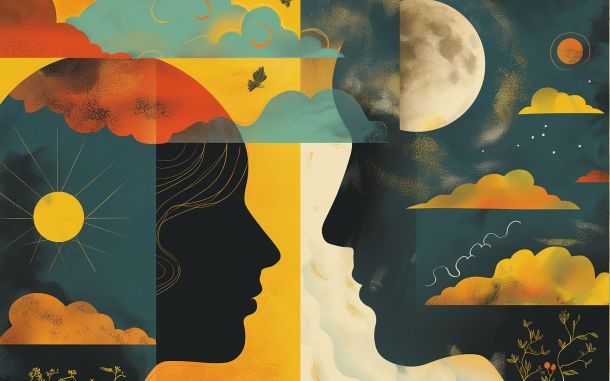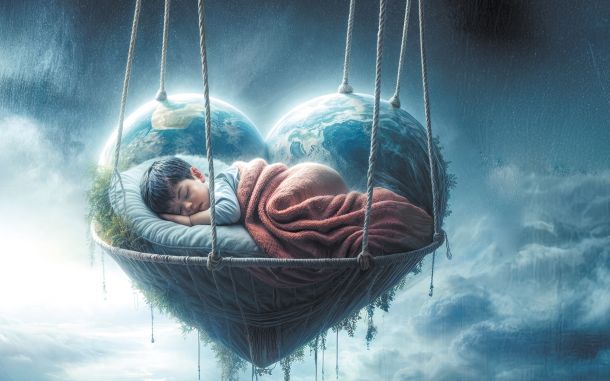Who Are You?

In This Article
-
You are not merely the sum of your experiences, but the witness to them.
-
To know yourself is to begin knowing the One who created you.
-
The question ‘Who are you?’ is not answered in words, but in the way you live.
Imagine you are walking through a city park and spot a bag that appears to contain valuable items, with no one else around. You realize the bag belongs to someone who will likely return soon to retrieve it. Should you take it yourself? After all, you could use some extra financial help given your recent economic hardships! No one is there to see you. If no one will ever know, what is the problem with taking it? It might be a small loss to the owner, but it would be a significant gain for you! Why not?
Imagine you have a friend who is a bit shy and struggles to express himself in social situations. And say that he is known to be picked on by his peers, or being bullied. You have every opportunity to tease him and get a laugh at his expense. But he isn’t responding well to your jokes. Who cares? You just want to have fun, and he’ll be fine—won’t he?
Imagine you’ve just finished a refreshing drink and are left holding the empty plastic bottle. You’re out in nature, and no one is around to see if you toss the bottle into the woods. You know it’s bad for the environment, and you can already see other people’s litter scattered nearby—but who cares? What’s one more bottle on top of the rest? It’s not going to make a big difference, right?
Who knows? Who cares? Maybe no one will ever find out. Maybe no one will ever care. But more than anyone else, besides the All-Knowing One, you know the truth
When you steal something or do something wrong, even if no one is there to call you a thief, you are the one who labels yourself as such. You know it. You know that you have become a petty thief. In the end, you declare who you are to yourself.
When you insult or attack someone, even if you can get away with it, you define your identity as a person who transgresses against others. You declare that you are a transgressor. Even if others do not know or care, you know the truth. With every challenging decision we make, we declare who we are. We say “This is who I am.” And all these decisions ultimately shape our identity [1].
How we identify ourselves shapes our mindset and influences every aspect of our lives.
If you see yourself as a petty, opportunistic thief, you’ll assume that everyone else is a thief in one way or another. If you are involved in fraudulent activities, you’ll suspect others are fraudsters just like you—or, if they aren’t, you might consider them naïve or weak. If you see life as a constant struggle to survive, you’ll believe that every human, animal, and plant is locked in battle. The whole universe becomes a war zone, and people live in fear. On the contrary, if you are a peaceful person who respects others, you’ll notice beauty in people and in the world around you. You’ll think about the harmony and peace in others. As the saying goes, “A person who sees the good in things has good thoughts. And he who has good thoughts receives pleasure from life” [2].
The one who truly suffers from a wrongful act is not the person who is harmed, but the person who commits the act. Those who are wronged often recover, move on, or learn and grow from their experiences. But the one who inflicts harm is shaping a destiny that may be hard to change for the rest of their life. As people continue to respond to events in the same way, their reactions become hardwired; a part of their very biology. With every action we take, we determine our identities. Similarly, the true beneficiary of a good act is the person who performs it. Surprisingly, helping others is not that easy as it sounds. The odds of being in the right place at the right time, with the right resources to help, are slim at best. Simply handing out free money may look like kindness, but it can sometimes cause more harm than good in the long run—for instance, studies have shown that lottery winners often end up worse off than before. That’s why, when we find ourselves with a genuine opportunity to help someone, we should see it as a rare chance to make a difference in someone’s life—a gift to be cherished. By doing good, we shape our own identity.
We observe the outer world through the mirrors within us. From this, we can build a recipe for happiness: if we want to enjoy our lives, we must start by reshaping our own identity. If we want real change, it begins by changing who we believe ourselves to be.
Identity change
Changing our identity is one of the most difficult things we can do in life. Human beings have a curious resistance to any kind of change. We get used to certain routines and stick with them—this is true for our personalities, careers, where we live, and more. Once we settle into a habit, not only does it stay with us, but we’re also reluctant to let it go. As Tony Robbins says, “The strongest force in human personality is the need to stay consistent with how we define ourselves.”
So, what do we do when we want to change? People often want to build good habits and get rid of bad ones. We all know how difficult it is to start doing something regularly. Even when we’re fully aware of the benefits, knowing alone isn’t enough to create change. I know that I should exercise more, eat less, read more, and so on, but turning these actions into habits is the challenging part.
A much easier way to build new habits is through the identity-based behavior change [3]. Instead of focusing on tactics alone, it’s more effective to associate your identity with the kind of person who naturally displays those habits. his method begins by deciding who you want to be. Then, ask yourself what that person would do in a given situation, and start acting accordingly.
Next, give yourself permission to achieve small wins in the direction of your new identity. Trying to change your behavior without first changing how you see yourself is unlikely to succeed. If you want to act honestly, you need to become an honest person. If you want to achieve certain business outcomes, you have to become someone who accomplishes those goals—an entrepreneur. The more clearly you envision yourself as that person, the more likely you are to act in alignment. Prove to yourself who you are by taking the necessary steps.
A similar approach to behavior change can also be found in faith traditions which encourage people to do good deeds by connecting actions to their identities. For example, in the Qur’an 3:76, it is stated: “Absolutely! Those who honor their trusts and shun evil, surely God loves those who are mindful of Him.” In this verse, the person who is loved by God is depicted through their actions. The reader is encouraged to adopt the identity of such a person. If you want to be loved by God, you must become someone who honors trusts, avoids evil, and remains mindful of Him. By embracing this identity, you place yourself among those who are loved by Him. If we want to change our lives, we have to start changing who we are. Our identity and personality are what shape our personal reality [4]. We cannot change until we transform how we think, how we respond, how we act, and how we feel.
Nothing changes in our lives until we change ourselves.
I do not exploit other people’s weaknesses. I care for the environment. I serve tea to my significant other. I do not thrive at the expense of others. I respect differences of opinion. I strive to do my work well. I believe in human dignity and freedom. Why?
Because this is who I am.
References
1 How to make hard choices, TED Talks, Ruth Chang.
2 Seeds of reality, 50th seed. Bediuzzaman Said Nursi.
3 Atomic Habits, James Clear.
4 Joe Dispenza.









